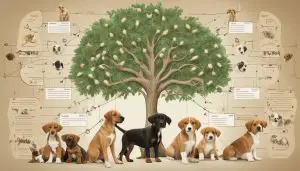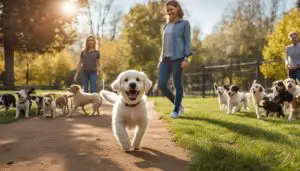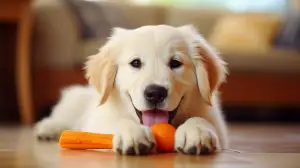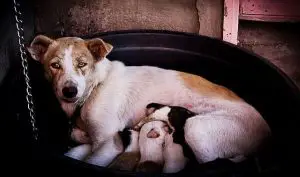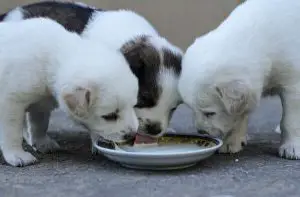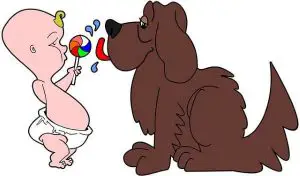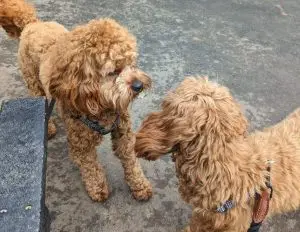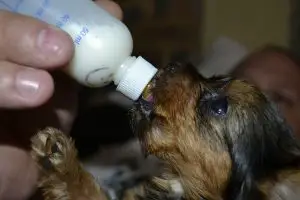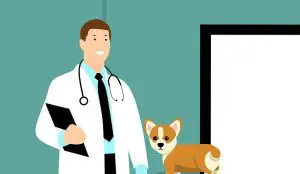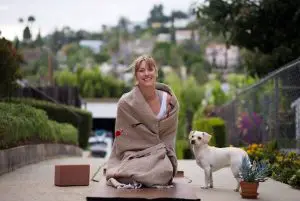As a new puppy owner, it's important to keep a close eye on your furry friend. Puppies are curious and energetic, which means they require constant supervision to stay safe. However, as your puppy grows and develops, they will start to become more independent and require less supervision. But when exactly do puppies require less supervision?
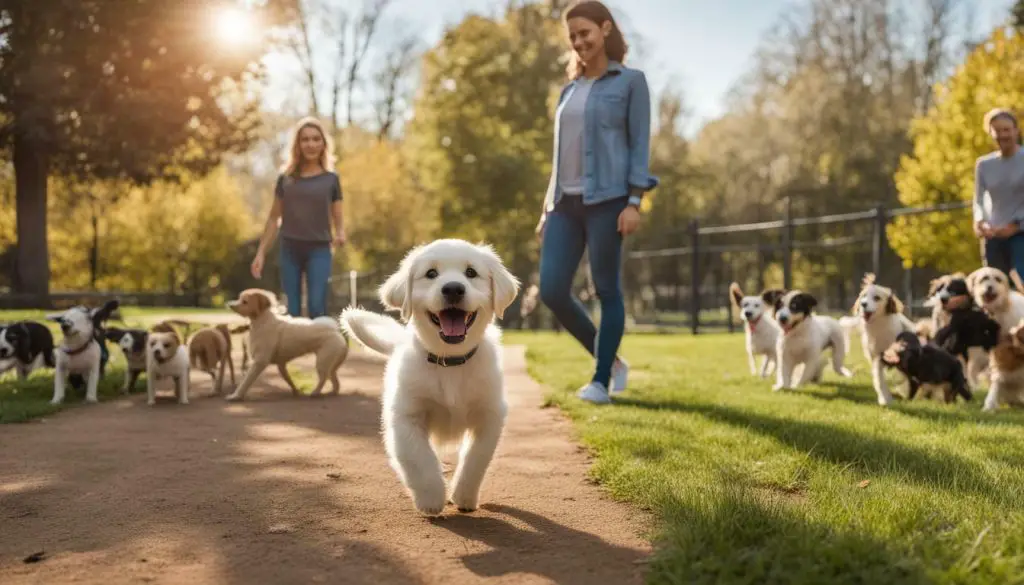
The answer to this question depends on a few different factors, including your puppy's age, breed, and personality. In this article, I'll provide a detailed guide to help you understand when your puppy may be ready for more freedom and less supervision. I'll also provide tips on how to manage your puppy's growing independence and how to monitor their progress.
Table of Contents
- Understanding Puppy Development Stages
- Reducing the Level of Supervision Needed
- Adjusting to Your Puppy's Growing Independence
- Monitoring Your Puppy's Progress
- Conclusion
- FAQ
- Q: When do puppies require less supervision?
- Q: What are the stages of puppy development?
- Q: How can I reduce the level of supervision needed for my puppy?
- Q: How do I adjust to my puppy's growing independence?
- Q: How do I monitor my puppy's progress?
- Q: Any concluding thoughts on reducing puppy supervision?
- Read my latest puppy articles here:
Key Takeaways:
- Puppies require constant supervision to stay safe
- The age, breed, and personality of your puppy will determine when they require less supervision
- Reducing supervision too early can lead to accidents and behavioural problems
- Monitoring your puppy's progress is important to ensure they are developing self-sufficiency at a healthy pace
Understanding Puppy Development Stages
As a new puppy owner, it's important to understand the developmental stages your furry friend will go through. By doing so, you'll know when they require more or less supervision, and how to best manage their growing independence.
| Stage | Description |
|---|---|
| Neonatal | This stage lasts from birth until around 2 weeks of age. During this time, puppies are completely dependent on their mother and littermates for survival. They cannot regulate their body temperature or eliminate waste on their own. |
| Transitional | The transitional stage lasts from 2-4 weeks old. Puppies begin to open their eyes and ears, and start to develop their sense of smell. They also begin to stand, walk, and play. |
| Socialization | This stage lasts from 4-12 weeks old. Puppies become more aware of their surroundings and start to learn basic social skills. They also become more independent and may start to explore their environment. |
During the socialization stage, it's important to expose your puppy to a variety of people, animals, and environments to help them develop into a well-adjusted adult dog. However, it's also important to supervise them closely during this time, as they are still learning and can be easily overwhelmed.
As your puppy enters adolescence (around 4-6 months old), they may start to challenge your authority and test boundaries. This is a normal part of their development, but it's important to continue providing consistent rules and boundaries to help them learn appropriate behaviour.
By understanding the different stages of puppy development and knowing when to increase or decrease supervision, you can provide your furry friend with the guidance they need to become a happy, well-behaved adult dog.
Reducing the Level of Supervision Needed
As your puppy grows and develops, they will naturally become more independent and require less supervision. However, it's important to remember that this process should be gradual and carefully managed to ensure your puppy's safety and wellbeing.
One way to begin reducing the level of supervision needed is to gradually increase your puppy's access to different areas of your home. Start by giving them access to a small, safe area that is easy to monitor, and gradually expand their boundaries as they demonstrate good behaviour and reliability.
Another way to reduce the need for constant supervision is to provide your puppy with plenty of mental and physical stimulation. This can include regular playtime, interactive toys, and obedience training sessions, all of which will help to keep your puppy engaged, stimulated and content.
It's also important to set clear boundaries and expectations for your puppy, so they understand what is and isn't acceptable behaviour. Consistency and positive reinforcement are key here, as is a clear and well-established routine that your puppy can rely on.
Remember, reducing the level of supervision needed doesn't mean abandoning your puppy altogether. Regular, thoughtful monitoring is still important to ensure your puppy's safety and progress, but with careful management and gradual increase in freedom, your puppy can become more independent and self-sufficient over time.
Adjusting to Your Puppy's Growing Independence
As your puppy grows and develops, they will naturally become more independent and self-sufficient. This can be a great thing, but it also means that you may need to adjust the level of supervision you provide to ensure they are safe and happy.
One key milestone to watch for is when your puppy starts to become reliably potty trained. Once your puppy can hold their bladder for longer periods of time and is consistently going outside to do their business, you can start giving them more freedom in the house.
Another milestone to watch for is when your puppy stops chewing on inappropriate items and only chews on their designated toys. At this point, you can start giving your puppy more freedom to explore their environment without constant supervision.
Gradually Increase Freedom
It's important to gradually increase your puppy's freedom as they show that they can handle it. You don't want to give your puppy too much freedom too quickly, as this can lead to accidents or destructive behaviour.
Start by confining your puppy to a single room or area of the house where they are safe and comfortable. As your puppy demonstrates their ability to handle this level of freedom, you can gradually expand their access to other areas of the house.
Remember to always supervise your puppy when they are exploring new areas or experiencing new things. This will help you identify any potential hazards and intervene if necessary.
Set Your Puppy Up for Success
In addition to gradually increasing your puppy's freedom, it's important to set them up for success by providing plenty of opportunities for exercise, mental stimulation, and socialization.
Make sure your puppy gets plenty of exercise every day to burn off excess energy and prevent destructive behaviour. Provide plenty of toys and puzzles to keep your puppy mentally engaged and stimulated.
Finally, socialize your puppy with a variety of people and animals to help them develop good social skills and reduce the risk of fear-based behaviour problems.
With patience, consistency, and plenty of positive reinforcement, you can help your puppy navigate the transition from constant supervision to greater independence and self-sufficiency.
Monitoring Your Puppy's Progress
As your puppy continues to grow and develop, it's important to monitor their progress and ensure they are reaching their milestones. These milestones include increased independence and self-sufficiency, as well as decreased need for constant supervision.
One way to monitor your puppy's progress is to keep track of their behaviour and habits. Are they becoming more confident and independent? Are they able to entertain themselves without constant attention or supervision? These are signs that your puppy is developing and maturing.
Another way to monitor your puppy's progress is to gradually increase their freedom and assess their response. Start by allowing your puppy to explore a small room on their own for a short period of time. If they do well, gradually increase the amount of time and space they are allowed. If they struggle or become nervous, take a step back and provide more supervision until they are ready for more independence.
It's also important to continue providing socialization opportunities for your puppy as they become more independent. This can include introducing them to new environments, people, and animals in controlled settings.
By monitoring your puppy's progress and adjusting accordingly, you can help them reach their full potential and become a happy, well-adjusted adult dog.
Conclusion
Overall, managing a puppy's supervision needs can be a challenging task, but it's important to remember that it's a gradual process. You can't expect your puppy to be completely independent from day one, but with patience, consistency and understanding, you can gradually reduce the level of supervision needed and adjust to your puppy's growing independence.
Remember to take note of your puppy's milestones, such as their ability to hold their bladder for longer periods and their increased self-sufficiency. As they reach these milestones, you can adjust their routine and freedom accordingly.
Always monitor your puppy's progress and adjust your approach as needed. With time and effort, you'll be able to strike the right balance between training and freedom, and enjoy a happy, healthy and well-behaved companion for years to come.
FAQ
Q: When do puppies require less supervision?
A: Puppies typically require less supervision as they grow older and gain more independence. It is important to understand the different stages of puppy development to know when to reduce supervision.
Q: What are the stages of puppy development?
A: Puppy development can be divided into several stages, including the neonatal stage, transitional stage, socialization period, and adolescence. Each stage has its own characteristics and requires different levels of supervision.
Q: How can I reduce the level of supervision needed for my puppy?
A: There are several ways to reduce puppy supervision, such as crate training, providing a safe and puppy-proofed environment, gradually increasing your puppy's freedom, and teaching them basic obedience commands.
Q: How do I adjust to my puppy's growing independence?
A: It is important to gradually adjust to your puppy's growing independence by giving them more freedom and allowing them to make their own decisions within safe boundaries. This can be done through positive reinforcement training and gradually increasing their access to different areas of your home.
Q: How do I monitor my puppy's progress?
A: You can monitor your puppy's progress by observing their behavior, assessing their ability to follow commands and make good decisions, and gradually giving them more freedom and responsibility. It is important to celebrate their milestones and continue providing guidance and training as needed.
Q: Any concluding thoughts on reducing puppy supervision?
A: Reducing puppy supervision requires patience, consistency, and understanding. By gradually allowing your puppy more freedom and independence, while still providing guidance and supervision when necessary, you can help them develop into a well-behaved and self-sufficient adult dog.
Read my latest puppy articles here:
- Can Puppies Look Like Their Grandparents? Unravelling the Mystery!Have you ever noticed a striking resemblance between your new puppy and their grandparents? Perhaps they share the same colouring or have similar facial features? It's not uncommon for puppies to resemble their grandparents, and in this article, I will explore the fascinating topic of whether this is possible and why it happens. We will… Read more: Can Puppies Look Like Their Grandparents? Unravelling the Mystery!
- When Do Puppies Require Less Supervision? A Detailed Guide.As a new puppy owner, it's important to keep a close eye on your furry friend. Puppies are curious and energetic, which means they require constant supervision to stay safe. However, as your puppy grows and develops, they will start to become more independent and require less supervision. But when exactly do puppies require less… Read more: When Do Puppies Require Less Supervision? A Detailed Guide.
- Can Puppy Eat Salmon? – A Friendly Guide to Feeding PuppiesWelcome to our friendly guide on whether it is safe for a puppy to eat salmon. As a pet owner, you want to ensure that your furry friend is receiving the best possible nutrition to support their well-being. Salmon is a nutritious fish that provides several health benefits for dogs, but is it safe for… Read more: Can Puppy Eat Salmon? – A Friendly Guide to Feeding Puppies
- Carrots for Puppies Teething: A Natural Solution for Pain ReliefWhen your little furry friend is going through the teething process, it can be a challenging time for both of you. Thankfully, there are natural remedies that can help relieve their pain while promoting overall health. One such remedy is carrots for puppies teething. Carrots are an excellent source of vitamins and minerals that can… Read more: Carrots for Puppies Teething: A Natural Solution for Pain Relief
- How long do puppies need milk?Puppies typically need milk as their primary source of nutrition until they are around 4 to 6 weeks old. After that, they can gradually transition to solid food, but it's essential to consult a vet for guidance on the appropriate time to introduce solids to ensure the puppies' needs are met. Welcoming a litter of… Read more: How long do puppies need milk?
- Can ultrasound be wrong about puppies?Yes, ultrasound can sometimes be wrong about the number of puppies expected. Factors like foetal position, maternal tissue interference, or early gestation can affect the precision of the ultrasound results. Check with a vet for the most accurate assessment. Bringing new puppies into the world is an exciting time for dog owners and breeders. One… Read more: Can ultrasound be wrong about puppies?
- Why does a mother dog lay on her puppies?A mother dog lays on her puppies to provide warmth, comfort, and security. This behaviour is promoted by the release of oxytocin and prolactin, which awaken a mother’s protective instincts. Laying on her puppies helps regulate their body temperature and promotes bonding. When a dog mum gives birth to puppies, it’s a super exciting time,… Read more: Why does a mother dog lay on her puppies?
- Do puppies have rabies when they are born?No, puppies are not born with rabies. Rabies is a viral disease transmitted through the bite of an infected animal or, very rarely, through a mother’s milk if the mother carries the disease. It's crucial to vaccinate puppies to protect them from this potentially deadly disease. In the rest of this piece, we’ll explore if… Read more: Do puppies have rabies when they are born?
- Do puppies stop moving before birth? Yes, absolutely puppies often do stop moving before birth. Later in pregnancy, puppies are likely to move more to get into the proper position for delivery. After that, puppies usually settle and stop moving. Preparing for the birth of new puppies can be as challenging as it is exciting. You know there’ll be cuteness in… Read more: Do puppies stop moving before birth?
- What do breeders do with unsold puppies?When ethical breeders have unsold puppies, they may explore various options such as advertising, reducing prices, or giving them more training. They may also seek reputable homes through adoption, or work with rescue organisations to ensure the puppies find suitable, loving homes. Breeding can be tremendously rewarding. With litters of anywhere from a single pup… Read more: What do breeders do with unsold puppies?
- Do puppies bark more when teething?Yes, puppies do bark more when teething. The discomfort and pain caused by teething can lead to increased restlessness and irritability, making them bark more often. You can use teething toys and soothing remedies to help relieve their discomfort and curb their barking. Puppies are known for their adorable antics and playful nature. You may… Read more: Do puppies bark more when teething?
- When do puppies become affectionate? Puppies start showing affection as early as a few weeks old. However, the timing depends on their personalities, socialisation, and bond with their owners. Most puppies develop increasing affection as they grow and form stronger emotional connections with their owners. Just as with us humans, puppies go through emotional development as they grow. In their… Read more: When do puppies become affectionate?
- Is birch tree milk good for puppies? The benefits of birch tree milk for puppies are not well known, though the answer is yes, in moderation. If in doubt, it’s best to provide them balanced commercial puppy food formulated to meet their specific nutritional needs to keep your pup healthy. Puppies are bundles of joy. I can testify to that fact because… Read more: Is birch tree milk good for puppies?
- Can you use puppy pads for babies?While not toxic to babies, puppy pads are designed for training puppies to do their business indoors and should not generally be used for babies. Instead, use specialised baby changing pads that are safe and hygienic. It may seem an outlandish idea to use puppy pads for babies, because we all know how important it… Read more: Can you use puppy pads for babies?
- Do puppies lose weight after birth?Unravel the mystery: Do puppies lose weight after birth? Learn about newborn puppy care and weight gain essentials. Start your puppy parenting journey here! As a new breeder or a pet owner, you might be wondering, "Do new-born puppies lose weight after birth?" This is a common question, especially for those who are new to… Read more: Do puppies lose weight after birth?
- Do puppies joints click?Do Puppies Joints Click? Exploring the Truth Puppy joint-clicking is a common occurrence in many breeds. But, it could be a sign of underlying health issues. To understand why it happens and how it affects their health, we need to know more. Joint clicking in puppies can have various causes. Stiffness or discomfort with consistent… Read more: Do puppies joints click?
- Why is milk coming out of puppies nose?Explore the reasons why is milk is coming out of your puppies nose, understand its implications on canine health, and learn safe feeding techniques. Imagine cradling your adorable new puppy, feeding it a bottle, and suddenly you see milk trickling out of its nose. Alarming? Yes. Unique? Not quite. It’s a phenomenon that's more common… Read more: Why is milk coming out of puppies nose?
- When can you hear puppies heartbeat with a stethoscope?Introduction to Puppies' Heartbeat Have you ever heard the beat of a pup's heart? It can be detected with a stethoscope by 4-5 weeks into pregnancy! As time passes, the heartbeat becomes louder and more audible. It's essential to have regular vet check-ups during pregnancy, to monitor the heartbeat. Plus, this can also help spot… Read more: When can you hear puppies heartbeat with a stethoscope?
- Does birth order matter in puppies?Explore, does birth order matter in puppies, regards personality, temperament and dominance. See my research, and opinion so you can love 'em, quirks and all! To understand the importance of birth order in puppies, delve into the impact on socialization, the effects on temperament, and the influences on dominance. By examining these sub-sections, you start… Read more: Does birth order matter in puppies?
- Puppy Yoga: The latest fitness trend for animal loversWhat is puppy yoga? The latest craze in the pet world is "Puppy yoga", it's a type of yoga that involves practicing yoga poses and exercises with a dog as a partner or prop. It is playful and fun, less "zen" than a normal yoga class but in my opinion far more enjoyable. It is… Read more: Puppy Yoga: The latest fitness trend for animal lovers
- Why do Dogs Lick Blankets? When you bring home your new pup, it’s an absolute joy. You’ll soon find that you both have some challenges ahead of you though, ranging from training your dog to potty train, to helping him get used to sleeping downstairs at night. Here though we discuss something you may not have thought about it until… Read more: Why do Dogs Lick Blankets?
- Leaving Your Dog Downstairs at NightShould you leave your dog downstairs at night? The simple answer is yes, you really should. New puppies are so adorable but remember when fully grown it will not be so convenient to have them sleeping in your room and heaven forbid on your bed. So no matter how heart breaking it might seem to… Read more: Leaving Your Dog Downstairs at Night
- Are puppy pads a good idea?Puppy pads, a great tool for potty training your pup. They're absorbent, easy to clean, and provide a designated pee pad area for them to relieve themselves. I strongly recommended them. However, there are also some downsides to using them so in this article I try to give a balanced view on potty pad training!… Read more: Are puppy pads a good idea?
- How to Stop a Puppy From Biting: Tips and TricksPuppy biting can be a real problem. It's cute when they are little, but it can become a real issue when they get older. Not only is it annoying, but it can also be dangerous if the puppy starts to nip at people's hands and faces. See tips and tricks and learn how to stop… Read more: How to Stop a Puppy From Biting: Tips and Tricks
- Do Puppies Sleep More When Teething?Puppies love their sleep, with some sleeping for as much as 20 hours a day, only waking to eat and play. But what about when your pup is teething? How can this affect their sleep? Does the discomfort of their adult teeth coming through keep them awake? Puppies tend to sleep a little more when… Read more: Do Puppies Sleep More When Teething?

